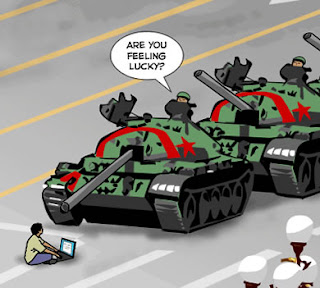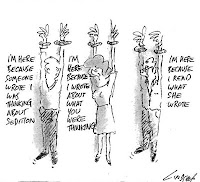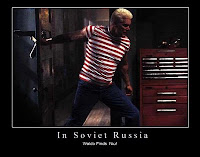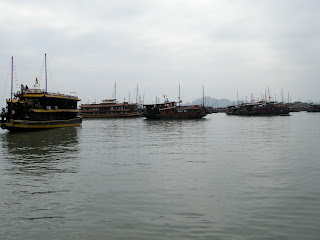 OK. So there's this interesting subplot going on right now, where a Korean blogger named Minerva has been arrested... basically for being popular, and right. He wrote stuff that seemed to show access to inside information about Korea's economic policy, and his predictions were so uncannily accurate that some think his soothsaying turned into self-fulfilling prophecies (or so the prosecution claims) as his following began to use his posts to guide their financial decisions.
OK. So there's this interesting subplot going on right now, where a Korean blogger named Minerva has been arrested... basically for being popular, and right. He wrote stuff that seemed to show access to inside information about Korea's economic policy, and his predictions were so uncannily accurate that some think his soothsaying turned into self-fulfilling prophecies (or so the prosecution claims) as his following began to use his posts to guide their financial decisions.Now, he never claimed to be an insider...he just happened to be right, again and again and again, speaking as if he were one, until people assumed he WAS one, until one of his correct predictions supposedly led to a big drop in the Korean won, costing the government a bunch of money needed to restabilize it. (So sez the article.)
I took a shortened, simplified version of this article from the Korea Times into my conversation class this evening (it was written by Sean Hayes of The Korean Law Blog), along with this story, about three bloggers in Suncheon who are being investigated for manipulating their posts' readership statistics in order to get on web-portal DAUM's "Most-read articles" list and gain wider readership for their anti-Lee Myung-bak articles.
The basics of the article I brought to class:
1. Foreign bloggers are nervous about Minerva being arrested basically for being popular, and right: a lot of us write stuff that might actually be illegal, naming names, saying bad things about public figures, and such.
 However, it would be a big black eye, and possibly cause an international incident for Korea if a foreign blogger is investigated for pure speech.
However, it would be a big black eye, and possibly cause an international incident for Korea if a foreign blogger is investigated for pure speech.2. There are so many people writing material on blogs that might be construed as illegal, that the bigwigs pretty much get to pick who to prosecute and who to ignore. Unsurprisingly, they pick on people who disagree with them.
3. Free speech in Korea is not protected in the same way it is in the West. Korea's free speech laws balance freedom of speech against the limitation that "neither speech nor the press shall violate the honor or rights of other person nor undermine public morals or social ethics" (quoted from my shortened version, not the original article)... not to mention, rights may be restricted again as necessary "for national security, law and order, or [the public good]"
 Now I'm not a lawyer, so I might be getting this all wrong. If I am, please correct me in regular English, not legalese. However, being a Westerner, it makes me nervous that such vaguely defined terms as "honor" "rights" "public morals" and "social ethics" are included in these laws, because terms like "public morals" can be twisted to fit pretty much any definition, if a clever enough sophist is involved.
Now I'm not a lawyer, so I might be getting this all wrong. If I am, please correct me in regular English, not legalese. However, being a Westerner, it makes me nervous that such vaguely defined terms as "honor" "rights" "public morals" and "social ethics" are included in these laws, because terms like "public morals" can be twisted to fit pretty much any definition, if a clever enough sophist is involved.Anyway, some interesting things came out of the discussion, which I brought into two different classes.
A few of the things I gathered:
1. In America, truth is the ultimate defense against libel: that is, if what you say is true, you're protected from charges of libel. Not so in Korea: as my friend Joe discovered when he got sued by his ex-boss for blogging his attempts to get his contractually-guaranteed severance payment, you can still be found liable for libel, even if you're telling the truth, if you damage someone's reputation, here in Korea. Calling his boss a crook got him in hot water, even though his boss WAS a crook!
2. Now, I'm not a lawyer, but what I gathered from the article and the conversations is basically that in Korea, freedom of speech is balanced against the public good, and social harmony, where in the West, generally truth is the final arbiter of freedom of speech, and other than hate speech or things like holocaust denial, you're pretty much free to say what you like.
 3. We discussed the difference between bloggers and journalists, and whether the government just painted themselves as the bogeyman by picking on bloggers, making bloggers who disagreed with the government's policy into sympathetic figures. On the other hand, we also discussed who, if not the government, was to hold journalists to account for distortions, yellow journalism, or agenda-driven writing.
3. We discussed the difference between bloggers and journalists, and whether the government just painted themselves as the bogeyman by picking on bloggers, making bloggers who disagreed with the government's policy into sympathetic figures. On the other hand, we also discussed who, if not the government, was to hold journalists to account for distortions, yellow journalism, or agenda-driven writing.North Korea came up here: see, comparing the USA or Canada, which have enjoyed democracy and a free press just about forever, with Korea, enjoying democracy since 1987, is a case of apples and oranges. Sure, USA can have lots of free speech laws: they don't have an open enemy bordering it, sending spies across their borders with instructions to use whatever means possible to stir up civil unrest and destabilize the government.
4. We discussed some other aspects of what is and isn't discussed in Korea, and how it is or isn't discussed, and I came across this:
First of all, I mentioned how mocking our leadership is practically a national sport in Canada: one of the high points of my week back in high school was the weekly episode of the "Royal Canadian Air Farce," a comedy troupe that deliciously skewered the leaders of the day, and I asked, "I've watched some Korean comedy...do Korean comedians imitate politicians and laugh at them, or make fun of them?"
Blank stares.
Nope. No, they pretty much don't, according to my class.
I showed them this clip, as an example of just. how. far. people push free speech in America, and how these guys got away with giving instructions on how to kill the president (hence the post title: I seriously don't want to kill anyone except that mosquito in my room), under the banner of free speech, and the defense that "I was only kidding!"
One of my students found this video laugh-out-loud hilarious. One was visibly bothered, and several just glazed over with quizzical looks.
5. When harmony instead of truth is the main currency of discourse, identity suddenly becomes important again, doesn't it? After all, if words must be balanced against one's responsibility to play their part in a harmonious society, how is one to be held accountable? Well...maybe the way Koreans are required use their ID numbers to log onto web portals starts making sense then.
 6. When I asked two of my students, "If a Korean blogger wrote a page that seemed anti-government, but was actually all a satirical piss-take (I didn't use the word piss-take, but you know)... if the police came to arrest that blogger, and he said, 'but it was all a joke' - what should we do?"
6. When I asked two of my students, "If a Korean blogger wrote a page that seemed anti-government, but was actually all a satirical piss-take (I didn't use the word piss-take, but you know)... if the police came to arrest that blogger, and he said, 'but it was all a joke' - what should we do?"And I was floored by their response. Both my students agreed that the comic intent was beside the point when spreading dissension, even sarcastically, and wouldn't have a problem with that satirist being brought to account. Does this reveal a focus on the effects of one's words, rather than the intentions... I'm not enough of a sociologist to say, nor to fit that into a larger context, but it's something I'll be watching for in the future, and maybe also asking others to weigh in on. It should be noted, and even they mentioned, that they belonged to an older generation, and that it's possible "the young kids" wouldn't have a problem with that kind of satire, even though they, the fogeys, did.
 7. In asking about a person's freedom to tell a joke about assassinating a world leader, one of my students spoke up quite passionately, saying that it's not fair -- apples and oranges (I provided that idiom) to compare Canada or America's tradition of free speech with modes of discourse in Korea, that comparing Korea with China or Japan, rather than the USA, gave a more fair context for comparison.
7. In asking about a person's freedom to tell a joke about assassinating a world leader, one of my students spoke up quite passionately, saying that it's not fair -- apples and oranges (I provided that idiom) to compare Canada or America's tradition of free speech with modes of discourse in Korea, that comparing Korea with China or Japan, rather than the USA, gave a more fair context for comparison.On the other hand, I responded, globalization is pulling societies out of their comfortable contexts, and shining spotlights into dark corners and unspoken social contracts that nobody wanted to mention, in all kinds of countries, and making things way more complex than they used to be, before the days of instant communication.
If a South-African is arrested on Korean soil for running a website through a British portal that uses satiric humor to mock the Korean president, and he says, "I was just kidding: don't you understand my quirky South-African sense of humor?"...which country's rules should we use to judge him?
 Personally, I'm torn. Even for a Korean on Korean case, for example, if Jang Ja-yeon, the Korean actress who committed suicide, knew that the truth was an iron-clad protection against libel, she might still be alive and fighting against the bastards who mistreated her, instead of her dying, and her manager facing a libel lawsuit from the same @$$holes who (allegedly) abused her. On the other hand, is my hard-nosed "The truth will set you free" wish for such unflinching truthspeaking just a leftover of my upbringing, and an unfair judgement on a high-context culture I ought to judge from the inside instead of the outside? Ech. I don't know. I think I'm not against free speech being balanced against responsibility. As a blogger whose real name is on his blog and circulated out and about, I know that my words will be attached to me. And I'm OK with that. In a way, yeah, I think people shouldn't write stuff online that they wouldn't want attached to their real name. Unless, for example, you're getting information about police suppression of Tibetan citizens out to the world. But you know, if your idea of fun is to write the most offensive blog you possibly can (and no, I'm not linking it), well, that's being irresponsible with your right to speak freely, frankly, and while I suppose you're free to do what you like as anonymously as you wish, buddy, I have nothing but contempt for your cowardice and pettiness.
Personally, I'm torn. Even for a Korean on Korean case, for example, if Jang Ja-yeon, the Korean actress who committed suicide, knew that the truth was an iron-clad protection against libel, she might still be alive and fighting against the bastards who mistreated her, instead of her dying, and her manager facing a libel lawsuit from the same @$$holes who (allegedly) abused her. On the other hand, is my hard-nosed "The truth will set you free" wish for such unflinching truthspeaking just a leftover of my upbringing, and an unfair judgement on a high-context culture I ought to judge from the inside instead of the outside? Ech. I don't know. I think I'm not against free speech being balanced against responsibility. As a blogger whose real name is on his blog and circulated out and about, I know that my words will be attached to me. And I'm OK with that. In a way, yeah, I think people shouldn't write stuff online that they wouldn't want attached to their real name. Unless, for example, you're getting information about police suppression of Tibetan citizens out to the world. But you know, if your idea of fun is to write the most offensive blog you possibly can (and no, I'm not linking it), well, that's being irresponsible with your right to speak freely, frankly, and while I suppose you're free to do what you like as anonymously as you wish, buddy, I have nothing but contempt for your cowardice and pettiness.I have a much lower "delete comment forever" threshhold for comments left anonymously, compared to commenters who leave a name and a link.
Let it be known that my students are not stupid. They know that the system ain't perfect, that right now the person in power gets to define what "the social good" means -- I asked if they thought those Suncheon bloggers would be in trouble if the articles they'd cheated to promote were pro-Lee Myungbak, and I got the kinds of knowing smiles that said they knew who had the power, and exactly how it was being wielded. I also asked what they think the president should do instead of arresting bloggers, but didn't have much class time to tease that out.
But until next time..."I was only kidding" doesn't quite carry the water it did back home, so be careful and all.
 Now that I think about it, it might be another step towards understanding why discussions with Koreans about hot topics are often fairly humorless: When I joked back in World Cup '06 that the winner of the next Korea-Japan soccer game should keep Dokdo, my Korean friend snarled, "But DOKDO belongs to KOREA!" failing completely to catch my attempt to make light of a hot topic. Even just last Saturday, a friend's offhand Dokdo quip got girlfriendoseyo's hackles up a bit, the topic had to be changed rather than things smoothed over. Sure, she was tired at the time...but still. This might well be a language gap, or a gap in types of humor...but might a cultural tendency not to make light of current affairs (at least not in a mocking way) play a part of it?
Now that I think about it, it might be another step towards understanding why discussions with Koreans about hot topics are often fairly humorless: When I joked back in World Cup '06 that the winner of the next Korea-Japan soccer game should keep Dokdo, my Korean friend snarled, "But DOKDO belongs to KOREA!" failing completely to catch my attempt to make light of a hot topic. Even just last Saturday, a friend's offhand Dokdo quip got girlfriendoseyo's hackles up a bit, the topic had to be changed rather than things smoothed over. Sure, she was tired at the time...but still. This might well be a language gap, or a gap in types of humor...but might a cultural tendency not to make light of current affairs (at least not in a mocking way) play a part of it?So the question of the post, after all that meandering, is:
I've heard it said before that Korean comedy shows are pretty much devoid of political humour. What about conversations? Especially for those of you who are behind the language barrier (because Koreans who have learned English very well have adapted more to western modes of discourse, so as a sample group, they're spoiled): is there such thing as a Dokdo joke behind the language barrier? Are politics made light of, laughed about and mocked, or does the awful earnestness of Dokdo advertising campaigns, for example, or humourless political discussions in English conversation classes, carry right through into the Korean language discussions of the same?
 Other food for thought about limitations on free speech: you might enjoy checking out South Park's brilliant two-part "Cartoon Wars" (Part 1) (Part 2) series in season ten, not long after the controversy over Danish cartoons mocking the prophet Mohammed, which ends with Jesus, George Bush, and a pregnant, single woman all crapping on an American Flag, and gets away with it because of the context in which they framed it. (See the clip here. Warning: there's crap.)
Other food for thought about limitations on free speech: you might enjoy checking out South Park's brilliant two-part "Cartoon Wars" (Part 1) (Part 2) series in season ten, not long after the controversy over Danish cartoons mocking the prophet Mohammed, which ends with Jesus, George Bush, and a pregnant, single woman all crapping on an American Flag, and gets away with it because of the context in which they framed it. (See the clip here. Warning: there's crap.)(speaking of censorship:)
I'm looking forward to an interesting conversation about this topic, readers. Don't let me down.






































